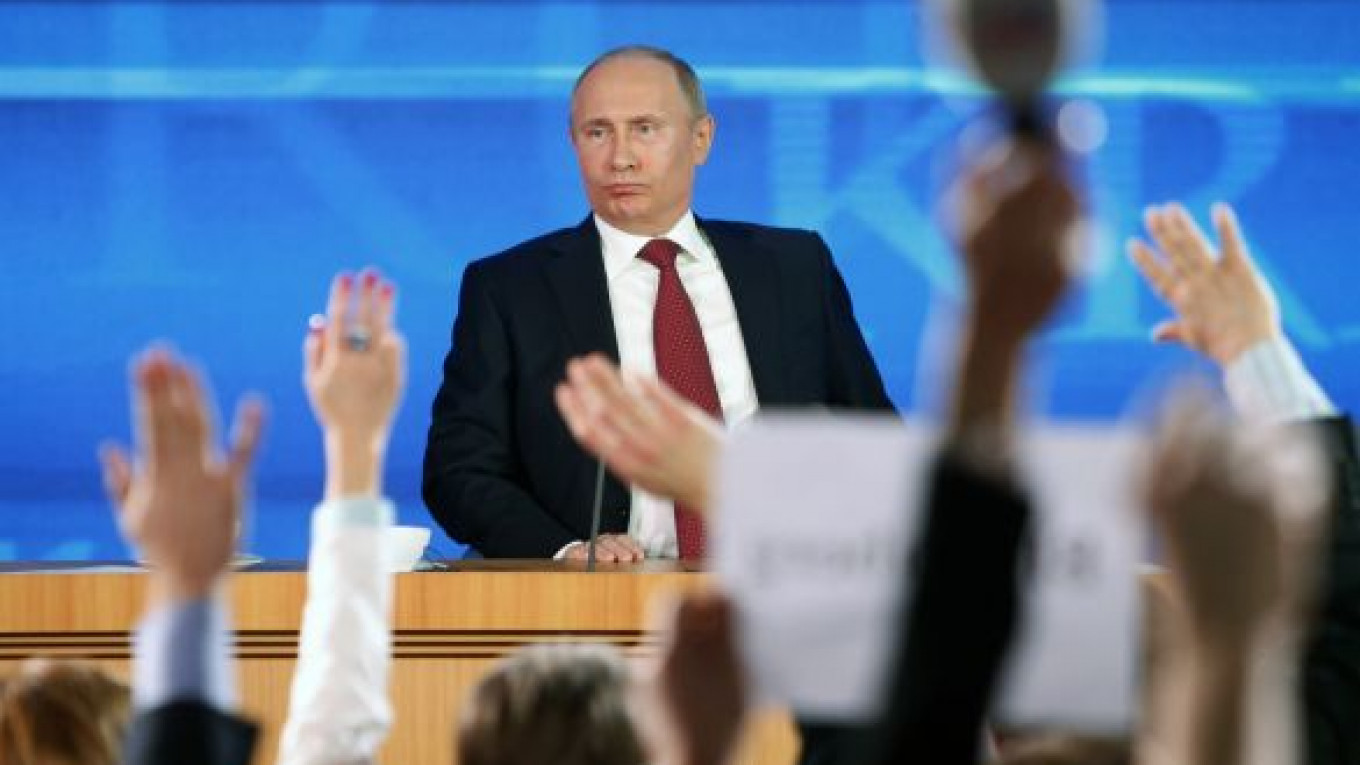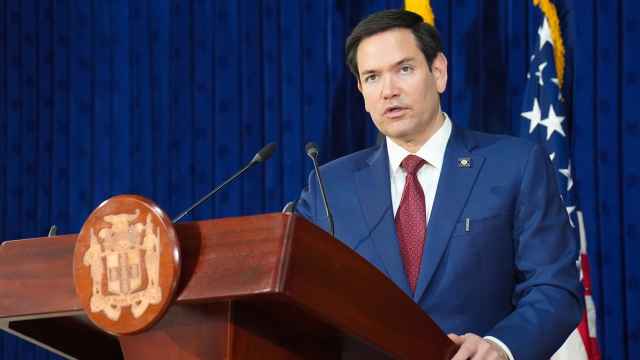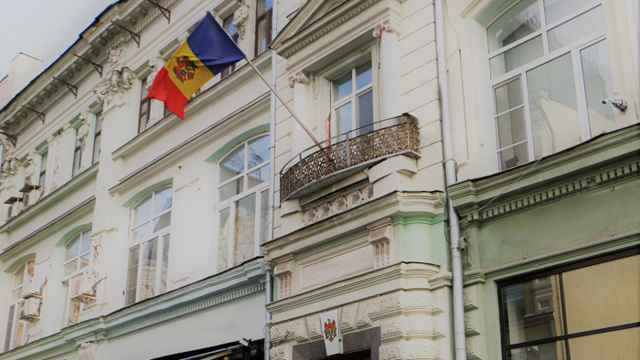President Vladimir Putin on Thursday signaled a return to the classic days of his presidency by presiding over a 4 1/2-hour news conference, which at times resembled a call-in show as reporters from the country’s far-flung regions scrambled to pass personal messages to the head of state.
The president appeared comfortable and bullish, if at times haughty, when answering often unscripted questions from more than 60 journalists — and ignoring attempts by his spokesman Dmitry Peskov to end the performance after four hours had passed.
The marathon event for some 1,200 accredited reporters marked a return of an annual tradition during Putin’s first two terms as president, though unlike then, it was held in the World Trade Center, in western Moscow, instead of the Kremlin.
Some reporters, notably from national publications not known for openly criticizing the Kremlin, grilled him, only to be rebuffed in trademark style.
“You think it is normal if [the U.S.] humiliates us? Are you a sadomasochist or what?” the president barked at Alexander Kolesnichenko of the weekly Argumenty i Fakty, who had suggested that the State Duma’s bill to ban U.S. adoptions was “cannibalistic.”
Putin engaged in a tit-for-tat exchange with Maria Solovenko, the editor of the Vladivostok-based Narodnoye Veche newspaper, who cornered him on the government’s current anti-corruption campaign at the recent firing of former Defense Minister Anatoly Serdyukov for alleged widespread graft in his ministry.
“This former defense minister is such a pain,” she said, adding that she wondered how Putin would return the stolen taxpayers’ money. “They stole billions. Don’t you know?” Solovenko asked, to which the president dryly replied “no.”
Putin then asked the editor to “sit down, please,” addressing her as Masha and using the informal you (ty) — which is not considered polite between strangers — to which she retorted with “Thank you, Vova.”
A reporter from Izvestia, widely regarded as one of the city’s most Kremlin-friendly dailies, accused Putin of building a an authoritarian regime of personal power over the past 12 years. “Don’t you think that this hinders Russia’s development?” he asked.
Putin rebuffed the question by saying his decision to heed the Constitution instead of changing it in 2008 and serving as prime minister for four years was ample proof that he was not authoritarian. “I consciously moved to a second post to guarantee the continuity of power,” he said, adding that “democracy is to observe the law.” He also offered trademark hawkishness over troubled relations with Washington, by lambasting the U.S. stance on the Magnitsky act as arrogant and defending the State Duma’s response to ban adoptions.
He argued that it was not Moscow’s fault that the U.S.-Russian “reset” offered by President Barack Obama was necessary. “We didn’t make the name, it was suggested by our American partners,” he said, adding that ties had deteriorated because of the Iraq war and U.S plans to install a missile defense system in Europe.
When Associated Press reporter Vladimir Izachenkov suggested that Moscow was losing influence in Syria by backing President Bashar Assad, a schoolmasterly Putin retorted: “Well listen, my dear, has Russia not lost its influence after interventionists started meddling?”
Putin paused when L.A. Times correspondent Sergei Loiko drew applause for a question that sharply criticized the planned adoption ban and the failure to investigate the death of lawyer Sergei Magnitsky. “What is that for?” he frowned, while clapping his hands slowly.
An adamant Putin retorted that the “Magnitsky tragedy” happened while he was prime minister and that he did not know the details of the case. He added that the adoption ban was more about U.S. lawmakers replacing the Jackson-Vanik trade sanctions with the Magnitsky Act sanctions.
“They did away with an anti-Soviet act and thought it necessary to adopt another anti-Russian act,” he said. He went on to argue that the cause of Magnitsky’s death in a Moscow detention center was still being investigated and that people were dying in U.S. prisons, too.
Putin touched on nationalities issues more than once. He praised Mordovia as a multiethnic republic with “absolutely harmonious” relations between religious and ethnic groups. The Volga region republic saw an increase in the number of people classifying themselves as Mordvin, a Finno-Ugric people, in the last census 2010. However, ethnic Russians still form a more than 50 percent majority.
The president reiterated that traditional Islam in Russia doesn’t use hijabs. “In our culture — and by this I mean traditional Islam — there are no hijabs,” he told a journalist from the North Caucasus Stavropol region, where schools have been trying to ban students’ Islamic headwear.
Significant time was devoted to regional media, whose reporters engaged in heated competition for the president’s or his spokesman’s attention. The audience’s mood swayed between amusement and frustration when questions were started with eulogies and thanks, while at least two journalists asked Putin to say hello to their children.
Peskov appeared to play with regional sentiment when awarding questions not to media outlets but to the region they hailed from.
“Let’s move from Echo Moskvy to Magadan,” he said, referring to the port city on the north Pacific coast.
Antonina Lukina of the Magadanskay Pravda newspaper then became the first reporter so far to publicly ask Putin about the recent speculations about his health.
But instead of questioning the Kremlin’s official explanation that the president’s two-month break from traveling in October and November was caused by a “sports injury,” she asked who was behind the online rumors and who profits from it.
“Political opponents profit — those who want to cast doubt on the government’s legitimacy and efficiency,” he said, adding the common Russian sarcastic phrase one gives to confirm one's health, “don’t wait [around for my death].”
The audience was upbeat when a reporter for the Lifenews.ru online tabloid asked Putin when the end of the world would happen. The president paused before saying in about 4.5 billion years when the sun will turn into a white dwarf.
The hall was less amused when a reporter from the Glavbukh accountancy magazine asked Putin to introduce a professional holiday for accountants.
When Putin finally declared the event over, the hall applauded.
Related articles:
A Message from The Moscow Times:
Dear readers,
We are facing unprecedented challenges. Russia's Prosecutor General's Office has designated The Moscow Times as an "undesirable" organization, criminalizing our work and putting our staff at risk of prosecution. This follows our earlier unjust labeling as a "foreign agent."
These actions are direct attempts to silence independent journalism in Russia. The authorities claim our work "discredits the decisions of the Russian leadership." We see things differently: we strive to provide accurate, unbiased reporting on Russia.
We, the journalists of The Moscow Times, refuse to be silenced. But to continue our work, we need your help.
Your support, no matter how small, makes a world of difference. If you can, please support us monthly starting from just $2. It's quick to set up, and every contribution makes a significant impact.
By supporting The Moscow Times, you're defending open, independent journalism in the face of repression. Thank you for standing with us.
Remind me later.







